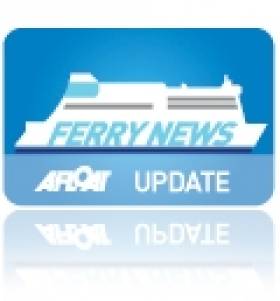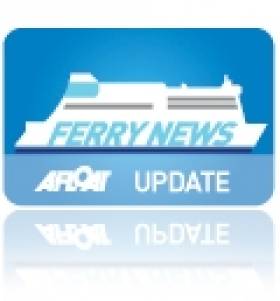Displaying items by tag: Rugby Ferry
Following Irish Rugby Triumph, Celtic Link Ferries Final St. Patrick’s Crossing Sets Sail before Stena Acquisition
#StPatricksSailing – Following Ireland's rugby triumph of the Six Nation's Championship yesterday in France, Celtic Link Ferries final promotional €1 crossing for St. Patrick's Day, has set sail this afternoon from Cherbourg to Rosslare, writes Jehan Ashmore.
As previously reported, Stena Line in February announced that they were to acquire Celtic Link, the Wexford based single-ferry operator, which only introduced the chartered Italian built and flagged ro-pax ferry Celtic Horizon in 2011. The 1,000 passenger, 200-car, 120 freight-unit vessel will continue serving the 17-hour Ireland-France link, a first for Stena Line which are to acquire the company's business on the route, with effect from 31 March.
In the meantime, there will be no doubt be a celebratory mode on board Celtic Horizon, on foot of the sporting success in the Stade de France venue outside Paris, combined with the Irish national day.
Among the passenger facilities on the overnight ferry are the Cherbourg Café, Tuskar Rock Bar and Lounge, a restaurant, cinema lounge and souvenir kiosk shop and accommodation in 2,4 and 6 berths cabins plus luxury suites.
To gain a further insight into the day to day running of the Celtic Horizon, built by Cantiere Navala Visentini shipyard in Portoviro, you can read an interview about one of her masters, Captain Richard Collins, by clicking this 'link' to a feature published in Ships Monthly.
Celtic Horizon is the only vessel of the company to have been clearly given a name directly associated with her owners trading route.
Her predecessors were Norman Voyager, another Visentini ro-pax of the same design and recently renamed Etretat for Brittany Ferries 'Economie' services and freight-ferry Diplomat which was scrapped in recent years.
She was the first vessel to launch operations for Celtic Link in 2005 following P&O Ferries withdrawal on the continental route the previous year.
Sail to the Six Nations Rugby in Dublin
#RUGBYFerry – Following the Irish rugby victory against the Welsh, Irish Ferries has space for fans wanting to watch the next RBS Six Nations match, when England encounter the team in green back on home ground in Dublin on 10 February.
The Holyhead-Dublin cruiseferry Ulysses, recently returned fresh from refit, will have plenty of space, with a capacity to handle more than 1,800 passengers and up to 1,300 cars alone. Fares on the route for a car and four people are available at around £108 per person return.
"We have four sailings a day into Dublin," says head of passenger sales Dermot Merrigan, "and we're always busy on match weekends. But with flight prices soaring around Six Nations dates, not to mention the baggage issues, a trip by car is a much more cost-effective and stress-free option."
SailRail tickets for foot passengers are also available, with combined ship and rail tickets from British mainline stations to Dublin from £76 per person return.
For further details contact: 08717 300 400 www.irishferries.com and for SailRail click HERE.































































